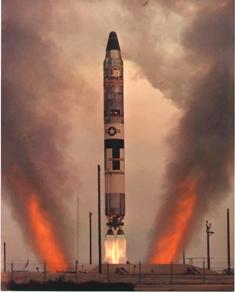Purge Cold War Thinking, Reduce Costly Arsenals
April 27, 2011
Featured Image
Today's top nuclear policy stories, events, and analysis with excerpts in bullet form.
Stories we're following today - Thursday, April 28, 2011:
Trimming Nuclear Excess - Daryl Kimball for The Arms Control Association [link]
- In the 20 years since the end of the Cold War, successive U.S. and Russian presidents have gradually reduced the size and salience of their enormous nuclear stockpiles...Both sides can and should go lower.
- If Congress and the White House are serious about reducing defense expenditures by $400 billion by 2023 to reduce the ballooning federal deficit, they should start by deferring or curtailing the Pentagon’s ambitious plan to upgrade and replace the strategic triad, which is projected to exceed $100 billion over the same period.
- Now is the time for U.S. and Russian leaders to further reduce their costly nuclear arsenals and purge their military strategies of obsolete Cold War thinking.
The United States, NATO’s Strategic Concept, and Nuclear Issue - Amb. Steven Pifer, Nuclear Policy Paper No. 6 [link]
- Two processes are now proceeding in parallel: the NATO Deterrence and Defense Posture Review (DDPR) and development of a U.S. approach to nonstrategic nuclear weapons for a possible future negotiation with Russia.
- Although many in Washington see a possibility to reduce U.S. nuclear weapons in Europe, in considering a U.S. position, Washington will want to reassure Central European allies and be mindful that nuclear policy in Europe has global implications.
- Some U.S. officials would like to move quickly, building on the momentum of New START’s ratification and entry into force. A big question is whether the president will want to push forward rapidly on next steps. And, with everything else going on, would there be time and bandwidth to make this question a priority?
Pakistan's Strategic Myopia - Michael Mazza in The Wall Street Journal [link]
- In response to New Delhi's contingency plans to retaliate with conventional arms following possible future terrorist attacks emanating from Pakistan, Islamabad is preparing to field tactical nuclear weapons.
- But Islamabad's decision is an irresponsible response to an as-yet unrealized limited conventional threat...the decision to field tactical weapons can only lead to intensified Indo-Pakistani nuclear competition.
- Pakistan has every right to defend itself...But in this case, the proper defense does not require the Pakistani military to field new weapons and aim them at India. Only by denying terrorist groups a safe haven from which to operate can Pakistan hope to ensure that the Indian military never puts [its conventional attack plans] into action.
Jimmy Carter Says North Korea Wants North-South Summit - Foster Klug for The Associated Press [link]
- Former U.S. President Jimmy Carter said Thursday that North Korean leader Kim Jong Il wants direct talks with South Korea's leader — an offer unlikely to be accepted until Pyongyang takes responsibility for violence that killed 50 South Koreans last year.
- A summit would be a major step toward smoothing over animosity fueled by the bloodshed, and a personal call from Kim is notable, though North Korea regularly pushes for the resumption of aid-for-nuclear-disarmament talks. It generally wants to return to the negotiating table without preconditions, however.
- The United States says it won't push forward on nuclear talks until South Korea is satisfied that the North has taken responsibility for last year's violence.
Goo’d Protection for Nuclear Weapons - Stephen Young for "All Things Nuclear" a Union of Concerned Scientists Blog [link]
- The safety and security of nuclear warheads is no laughing matter, even though some ways of trying to improve them—like that shown in this video from Sandia Lab—might cause a chuckle or two.
- It shows a white “goo” developed by scientists at Sandia that could encase a warhead in an emergency to make it harder for someone to run off with a warhead.
- The video is one method of increasing security, by increasing the amount of time it would take for any nefarious evil-doers to wander off with a nuclear warhead should they stumble upon one or, more likely, seek to steal one.



